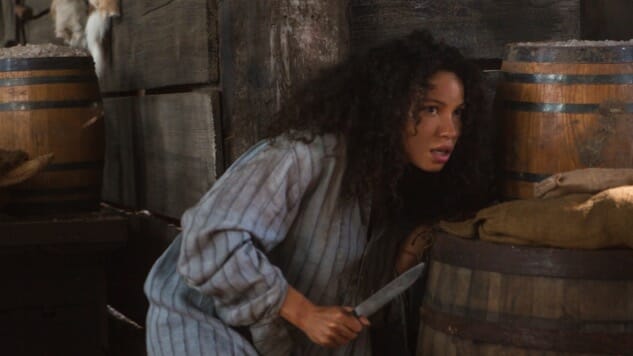Rosalee’s Favorite Things, Amélie and the Strangest Underground Episode Yet
(Episode 1.09)

Every week, I write about Underground under the guise of “TV Critic,” but a critic is, oftentimes, just a person trying to figure out how they could love (or hate) a single thing so much. Every week I think I’ve discovered the answer to my passion for Underground—Oh, it’s the focus on black flesh and blood as a means of freedom! No, it’s the attention paid to sensuality Wait, it must be the themes and critiques of religion. No, it’s Ernestine. Definitely Ernestine. And I’m never satisfied with the answer I give, because it seems there’s always something I forgot to talk about—some point I forgot to stress.
This week I realize I haven’t talked about how absolutely weird this show is—and how much I enjoy that. There have been hints of its weirdness all along. Herman using his own blood to mix the red paint. August getting cut during the Native American ritual. And that terrifying scene in the forest when we finally met his wife—all very weird. The creators of this show have been continuously taking risks in plot, character development and presentation. But it wasn’t until I watched last night’s “Black and Blue” that I saw a certain cinematic style of the series as a nod to those strange elements that make up some of my favorite films—especially those in French cinema.
It happened during Rosalee’s speech to Ben. He tells her that he already knows her name, because it’s on the slave bill. And she makes it a point to explain to him that knowing her name and how much she’s worth to her slaveowner does not equate to knowing anything about her. It reduces her.
I hate when my mama would hold my shoulder in the cook house. I like the sound of the leaves rustlin’ through the trees in the plantation. It’s like hearin’ a song on a windy day. I like the smell of these tin cookies Ms. Suzannah used to buy. But I never did try one.Yellow my favorite color! But the real shiny kind, like on this ribbon I used to like to wear. I ain’t just a name on a slave bill. I ain’t just a runaway. And I ain’t just five thousand dollars.
It’s a lovely and powerful speech that accomplishes so much. First, it carries on the oh-so-important thread of the yellow ribbon, which I wrote about after episode two, “War Chest,” and episode seven, “Cradle.” Of course, the other purpose of the speech is to allow Ben to see Rosalee as human. And the writers of this episode know that one way to humanize someone over the course of just a few lines, is to offer up their specificities, and their quirks.
As soon as Rosalee got to the part about the sound of the leaves, I was reminded me of the unforgettable opening to the film Amélie. We are introduced to Audrey Tautou’s Amélie Poulain, along with her parents (and then later, other characters), by way of their personal likes and dislikes. Not their favorite movies, or where they went to school—these things don’t tell us enough about a person. You have to get down to the quirks—those sounds and scents that they live for—to understand a whole being. This is how you humanize a person, and a character.
In other words, the speech isn’t just for Ben. It’s for those of us who still believe we have Rosalee pegged as one thing or another. “Black & Blue” is another reminder that this character is full of surprises. Her brilliant move with the devil’s snare was more proof that she cannot be underestimated—that the housegirl we met in episode one was holding back a lot. Jurnee Smollett-Bell recently spoke with Paste about the making of this complex character, and the impression I got was that Rosalee has always been a fighter; so it’s not that the housegirl has disappeared, it’s that her warrior self is finally getting to be revealed in new ways.
-

-

-

-

-

-

-

-

-

-

-

-

-

-

-

-

-

-

-

-

-

-

-

-

-

-

-

-

-

-

-

-

-

-

-

-

-

-

-

-








































